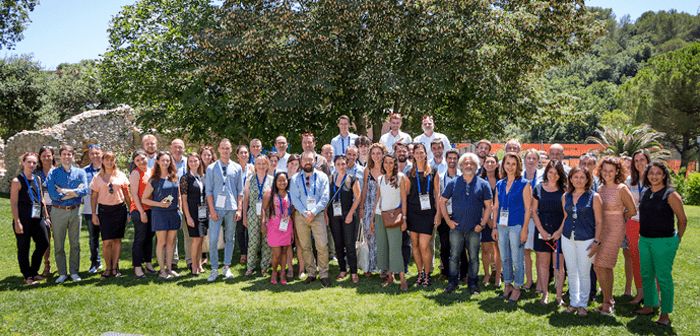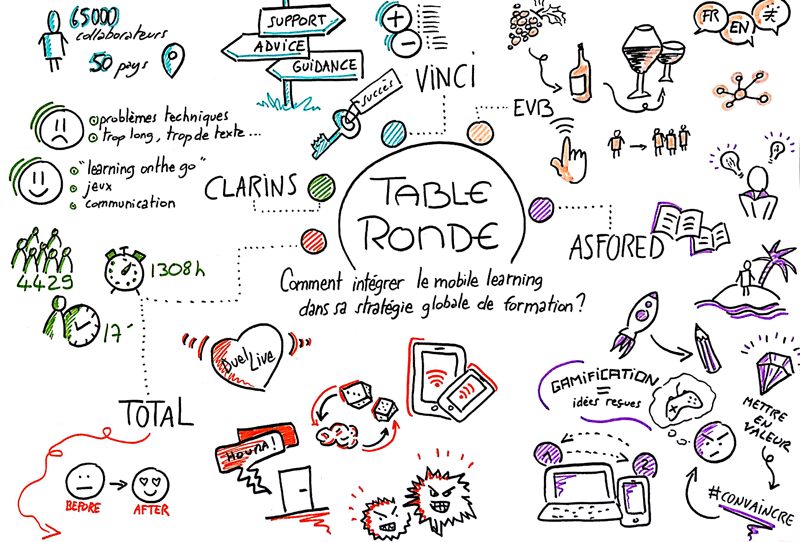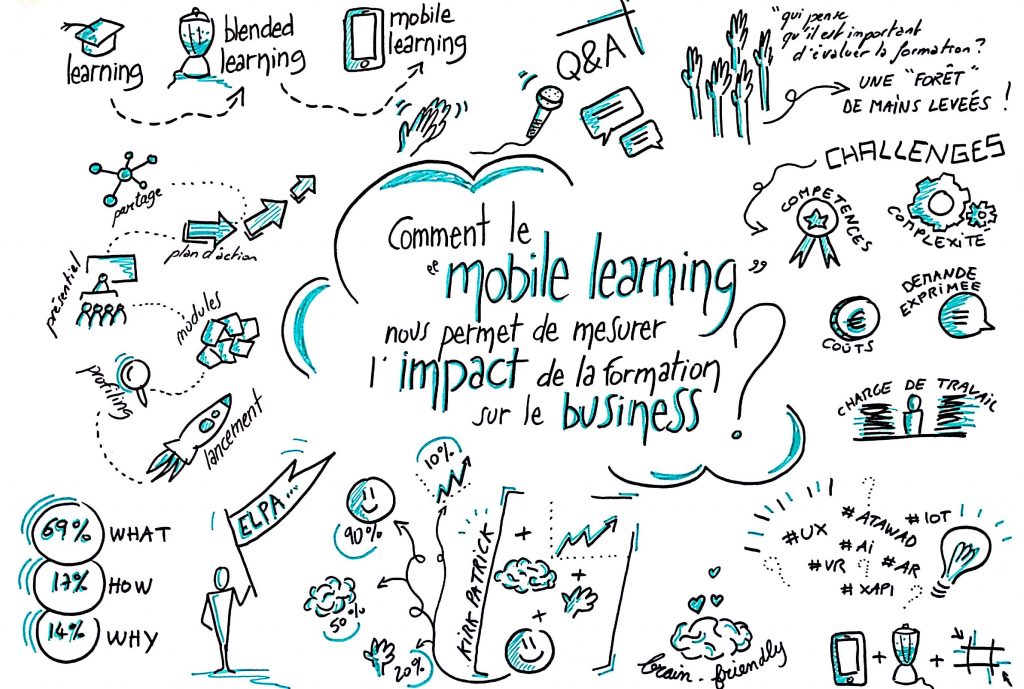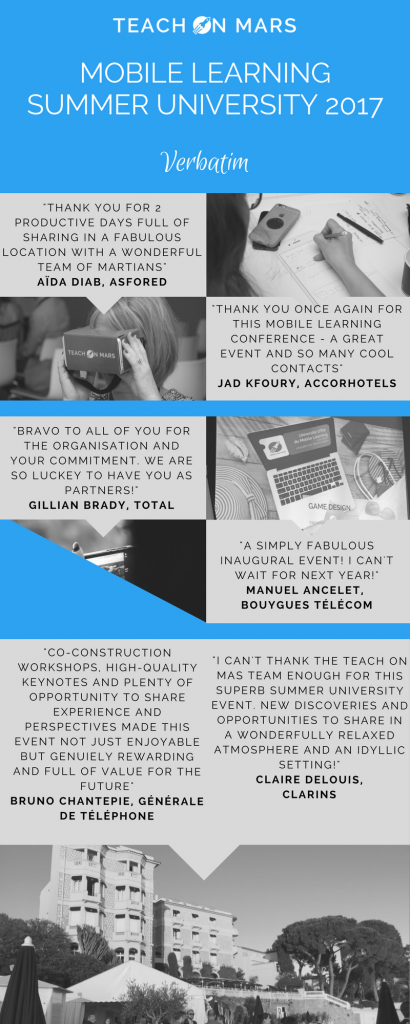The very first Mobile Learning Summer University was held on July 4 and 5, and it’s already clear that it will always be remembered as a turning point in the history and development of Teach on Mars. For the very first time, the start-up brought together learning and development managers from a wide range of blue-chip companies for two days of constructive and productive discussion, debate and experience sharing. Let’s look back at the resounding success of this groundbreaking event, which already has the organising team looking ahead with even greater ambition to next year.
Tuesday July 4, midday – the delegates arrive at the Beachcomber hotel under a blazing sun to be welcomed by both the Paris and Sophia Teach on Mars teams. After lunch in the shade of the palm-trees, it’s Vincent Desnot, Martian Leader, who steps up to get the ball rolling by officially opening the inaugural Mobile Learning Summer University.
Université d'été du mobile learning by @TeachonMarsfr : c'est parti ! #ueml17 pic.twitter.com/V3ktpiO8A2
— Jad KFOURY (@JadKFOURY) July 4, 2017
“Curtain up on the inaugural Mobile Learning Summer University by Teach on Mars @TeachonMars #ueml17”
? Faites de vos enseignants des héros ! @VincentDesnot
Université d'été #mobilelearning @TeachonMarsfr #UEML17 pic.twitter.com/smqxL43C6J— Christophe Solier (@Chris_SOLIER) July 4, 2017
“Turn your trainers into superheroes! @VincentDesnot #mobiellearning Summer University @TeachonMars #UEML17”
« Education is the most powerful weapon which you can use to change the world »
To open his speech Vincent chose this deeply significant quotation from Nelson Mandela, and followed it up with a key question: how do learning and development professionals guide learners through a complex digital learning landscape and empower them to take control of their development? In other words – and to summarise the underlying theme of the two days to come – how can we change our thinking on how we train learners? Teach on Mars sees its mission as providing the impulsion for this change and encouraging intrepid explorers to climb aboard for a journey of discovery that will see us all invent the future of learning together.
Enter Tiphaine Duchet, Customer Solutions Director at Teach on Mars, to develop the theme of the future of learning in her Digital Learning keynote. What Tiphaine is dreaming of is the day when we can finally do away once and for all with the “7 hours of training a year” rule, setting trainers free from the crippling confines of the traditional classroom to deliver genuinely relevant learning that is firmly grounded in reality.
"Le digital n'est rien sans la dimension humaine" #UEML17 @IFCAM @MHLearning @TeachonMarsfr pic.twitter.com/iZCE2mQ1PO
— Pauline Hubert (@PaulineHubert_) July 4, 2017
“Digital learning is nothing without the human dimension #UEML17 @IFCAM @MHLearning @TeachonMarsfr”
Round table: the practitioners’ perspectives
Next up was a round table discussion on the theme of how to integrate Mobile Learning into a broader learning strategy. No less than six influential speakers with real-world experience of precisely that challenge shared their insights and convictions on the question:
- Aïda Diab, Director of Asfored (the French national publishing industry training association), there to speak about the FNAC application project;
- Gillian Brady, HSE Training and Instructional Design Project Manager at Total;
- Claire Delouis, Head of Training Development with Clarins;
- Betty Abiliou, Digital learning manager and Thomas Doeuve, Digital learning manager & International training development manager with Vinci Energies;
- Stéphanie Barral, Director of the Bordeaux Wine School.
That evening, everyone gathered at the legendary Belles Rives Hotel in Juan-les-Pins, once home of novelist F. Scott Fitzgerald and the first beachfront hotel on the Côte d’Azur. The perfect location for a group photo in front of a Mediterranean sunset on the waterfont deck before dinner and the opportunity to pick up the discussions and debates of earlier in the day all over again.
The next morning saw the delegates divided into smaller groups for a rapid-fire series of highly interactive workshops on an exciting and varied range of topics. Unlocking the secrets of UX design, adapting gamification strategy to different gamer profiles, leveraging cognitive science to maximise learner engagement and finally discovering the latest tech trends and their potential application to learning and development.
Co-creation, building propositions, debating hypotheses and points of view – the delegates participated in it all with gusto and enthusiasm. And alongside that, they got the opportunity to try out first-hand potential game-changers like virtual reality, Beacons, the Internet of Things and Chatbots, under the watchful guidance of the Teach on Mars R&D team. At the end of the workshop process a structured debrief kept everyone focused on the question of practical application and helped them imagine how these innovations and others like them could add real-world value on the ground to their own learning solutions.
Session de game design : imaginer l'activité de demain dans l'app @TeachonMarsfr : bon moment de créativité et d'échanges ! #ueml17 pic.twitter.com/NCefGU3qxx
— Jad KFOURY (@JadKFOURY) July 4, 2017
“Game design session: crafting the learning activity of tomorrow in the @TeachonMarsfr app: a moment for creativity and sharing! #ueml17”
Atelier sur les sens mobilisables en #mobilelearning #ueml17 @TeachonMarsfr pic.twitter.com/nhSBTMwuJ3
— Jad KFOURY (@JadKFOURY) July 5, 2017
“Workshop on mobilisable senses at the #mobilelearning #ueml17 @TeachonMarsfr”
Mobile Learning and business impact
The microphone was then turned over to Jérôme Wargnier, Head of Education at Teach on Mars and CEO of Alberon Partners, who addressed the critical question of training evaluation. The founder of the Teach on Mars Academy demonstrated how mobile learning can help us better measure the business impact of our learning initiatives by using techniques to “leverage the data”, providing more accurate statistics and guaranteeing optimum efficiency for our learning design.
Looking ahead, delegates were then treated to a sneak preview video showcase of what’s coming next from Teach on Mars in the autumn. Finally, to round out proceedings, there was a “Summer University Challenge” designed to test how much people had learned during the various keynotes and workshops – with the prize for the winner being a free registration for the 2018 event!
Échange de bonnes pratiques, coconstruction du #MobileLearning de demain dans un cadre magnifique?A l'année prochaine @TeachonMarsfr #UEML17 pic.twitter.com/sxzSgoVxu4
— Aude Griller (@aude_griller) July 5, 2017
“Swapping best practises and co-constructing the #MobileLearning of tomorrow in an idyllic setting. See you next year @TeachonMarsfr #UEML17”
What the delegates said:
An unqualified success, then, for this inaugural Mobile Learning Summer University. The plan now is to build on this momentum with the creation of the Teach on Mars User Club – featuring special events, practitioner workshops, beta tester communities, best practice sharing and much, much more to keep pushing our synergies ever onward and ever upward, proving that “the sky is most certainly not the limit!”
Check out the workshop photo gallery on the Summer University website.
Marielle has been travelling in the Teach on Mars rocket ship for 6 years. After having contributed her skills in pedagogical engineering and training facilitation to guide clients towards success, she is now Product Owner, in charge of designing the new features of the solution.







![[Press Release] LumApps announces the acquisition of Teach on Mars, the leader in microlearning in Europe](https://www.teachonmars.com/wp-content/uploads/2023/12/✅-1-400x250.png)